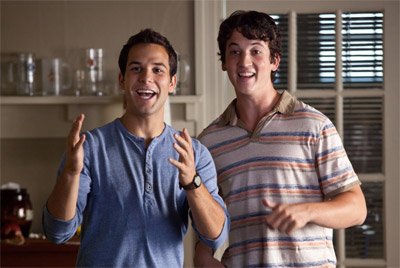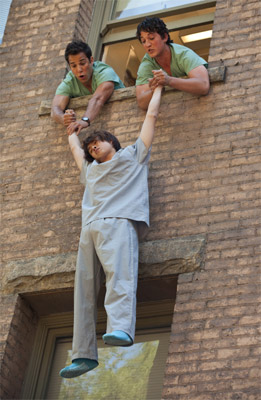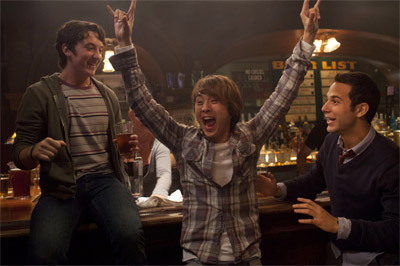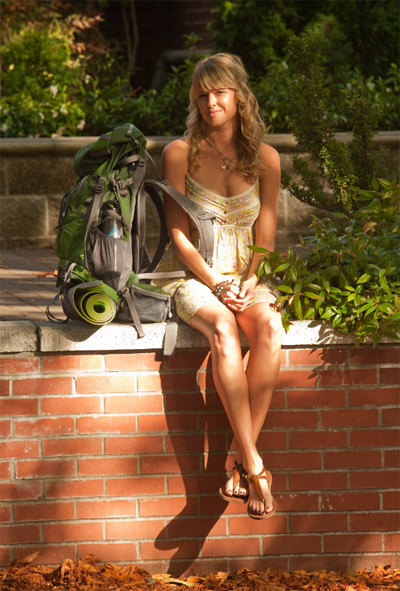Scott Moore 21 Over

21 Over
Cast: Skylar Astin, Miles Teller, Justin Chon, Sarah Wright, Jonathan Keltz, Bonnie Bentley
Directors: Jon Lucas, Scott Moore
Genre: Comedy
Rated: MA15+
Running Time: 93 minutes
Synopsis: When Straight-A college student Jeff Chang's two best friends take him out for his 21st birthday on the night before an important medical school interview, what was supposed to be a quick beer becomes a night of humiliation, over indulgence and utter debauchery.
Release Date: March 7th 2013
About The Production
On the heels of a resounding success in The Fighter, producers David Hoberman and Todd Lieberman were presented an exciting opportunity; not only would they reteam with the studio that helped earn them Academy Award nominations, but they would be collaborating with writers Jon Lucas and Scott Moore, whose work they long admired. '[Relativity] had this script that they wanted to make with Jon Lucas and Scott Moore and wanted to find producers for them," said David Hoberman. 'We had tried to be in business with Jon Lucas and Scott Moore as writers many times… and really loved the guys and their voice and their sense of humour… And we loved the script and loved them. It was kind of a no-brainer for us." Added Todd Lieberman, 'Producing an R-rated comedy isn't something that I'd ever done before and really wanted to. And so it felt like the opportunity to work with two guys who I really respected and wanted to work with… it seemed like kind of like the perfect situation."
The screenplay that garnered much adulation from its producers may have a simple premise at its core, but don't think it doesn't dig a little deeper. 'The basic premise is really three friends who get together to celebrate one of their twenty-first birthday and the whole night goes off the rails," said Scott Moore.
'[The question we explore is] are most friendships based on proximity?" This theme permeates the story; its relevance resoundingly clear when characters' friendships are tried by fire. 'You make all these great friendships, but is it because you're actually meeting people and having a deep connection, or is it just that you live down the hall from this guy and it's easy to hang out with him and go out and party?" said Scott Moore.
While outrageous scenes are the norm in this genre of comedy, 21 and Over surprises, balancing zany set-pieces with down-to-earth, relatable situations. 'Really broad comedy without the grounding isn't something that I'm necessarily interested in," said Todd Lieberman. 'And what this script offered was both."
'We were really excited about the idea of doing a plot-driven comedy," added Jon Lucas. 'A lot of people loved The Hangover, and we're grateful for all of them, but I don't think people loved it for the same reasons we loved it as writers. We loved it because it was a real; it was a comedy that was driven by story, as opposed to a comedy driven by an idea. The idea of writing mystery-comedy is exciting to us."
'The Hangover was really director Todd Phillips' movie and he did a great job. I'm proud to have my name on it, but this is more an expression of who we are. Our comedy comes from a slightly different place. We go for a slightly more emotional level. I saw that on the day we shot the vomiting in the bar scene," laughed Jon Lucas. 'But it is heartfelt."
'We also like a thriller structure in a comedy, so you're not just relying on jokes, because jokes are hard," Scott Lucas pointed out. 'Successful comedies have more than just laughs, they get you engaged and caring about the characters as you're laughing."
'Also, Jon Moore and I like to write movies about universal experiences," contributed Jon Moore. 'As writers, we try to make more out of everything. We had a checklist of a couple of things that we feel pretty much everybody has gone through. Almost everyone has had a hangover, and at some point in life you will turn 21. It is this little rite of passage. So we had this notion floating around and it married really well with this experience that Jon Moore had at a musical festival and it all came together as this movie."
 'I was in the desert at Coachella, so it's really hot and a friend's girlfriend's sister got messed up beyond belief. The tickets were really expensive, it was a big trip, and then he spent the whole time carrying this poor girl," laughed Scott Lucas. 'I'm 35 now and as a movie writer, you're basically pulling from everything that has ever happened to you. That feeling of carrying your buddy home, you probably did it once a semester in college, like that Vietnam pose of you getting your buddy home... I was starting to fire some axons in the brain and think maybe there's an idea there."
'I was in the desert at Coachella, so it's really hot and a friend's girlfriend's sister got messed up beyond belief. The tickets were really expensive, it was a big trip, and then he spent the whole time carrying this poor girl," laughed Scott Lucas. 'I'm 35 now and as a movie writer, you're basically pulling from everything that has ever happened to you. That feeling of carrying your buddy home, you probably did it once a semester in college, like that Vietnam pose of you getting your buddy home... I was starting to fire some axons in the brain and think maybe there's an idea there." '21 is a birthday you really celebrate," added Scott Lucas. 'You're so psyched. Turning 16 or 17 is a huge one because you can finally drive, and then turning 21 is really exciting. After that, I'm not saying it's all downhill, but you really don't celebrate 22. You kind of celebrate 30, but not really, and turning 40 definitely isn't awesome." Jon Moore added, 'Then you stop celebrating. Done."
'But 21 is where you go out with all your friends. We call it the American Bar Mitzvah in the movie, because it is oddly this day when America recognises you as a grownup," explained Scott Lucas. 'You can now do everything you haven't been able to do. That moment when you first walk into your first bar and you finally don't feel like you have to lie to someone to get in, you don't have to be a fraud, you can be welcomed in… it felt like fodder."
'College is a seminal moment in all our lives because there's that moment of freedom experienced for the first time," said David Hoberman. 'Adults look back fondly on discovering what college life was really like and those who are going through it can also relate. These are three guys that haven't seen each other in a while and have to get to know each other again. In the intervening years, they've changed. Each one goes through an arc: Miller has got to accept responsibility; Skylar needs to loosen up from his fast track to get into the financial world; and Jeff Chang, who is really the primary story, has gotten himself in trouble as a result of traveling in his father's footsteps. Each of them go through a journey, but they do end up reigniting that friendship they had years ago."
'It's actually a really clean idea - two great friends go visit their other third friend at college on his 21st birthday, get him so wasted that they can't find where he lives, and spend the entire night trying to find his home," added Todd Lieberman.
'This happens and this happens and this happens, but all the obstacles are in the service of a larger goal… get that guy home because his dad's going to kill him if he doesn't make that medical school interview. Along the way, they encounter an unbelievable amount of crazy set pieces, but the general construct of the movie is a very simple A to B, almost a road trip paradigm, but on one college campus."
'What's great about Jeff Chang is he is the core of the movie, but he is definitely passed out through a lot of it, and you have to learn about him through the guys uncovering information and clues from different individuals they meet along the way as to what's going on with him," revealed Scott Moore. 'Who is our friend? What happened to him? Where did this guy go wrong?" asked David Hoberman.
'You're peeling away an onion the whole time. It's an interesting way of telling a character's story… discovering things through people who are outside the circle, other than from the character himself."
'Part of the reason for that is the guy thing of being horrible at communication," Jon Lucas explained. 'The mystery's as much about getting Jeff Chang home as it is learning about what's happened to Jeff Chang since the guys have been living away from each other. Part of the inspiration for the movie character-wise, was this idea that dudes have great friends that they only talk to maybe once a year. Scott Moore and I are both married and our wives are way better at keeping in touch with people. Women regularly communicate with their friends.
Men think it's okay that it's been five years since talking to their best buddy. That's not super-healthy. Typically, these guys have gone off to college, which is the first time for a lot of people when they have to work to keep up with their first set of friends. You're with your old friends all the way through high school and then you separate and it's this question of are we going to keep it all together, or are we just some great time that happened for 18 years?"
'I have four friends that I've known since elementary school and kindergarten," shared Scott Moore. In our group of friends, we have a Todd Miller. We have one guy who fights to keep us all together. We have a good time when we get together and we love each other as friends do, but it's really this one guy who's constantly calling everybody to schedule stuff, who keeps us close."
'Todd Miller's totally crazy, but his best quality is he puts his friendship first, and these friendships really matters to him," commented Jon Lucas. Although Jon Lucas and Scott Moore are hardly newcomers to the world of big feature comedies, 21 and Over marks their directorial debut. 'First-time directors? You wouldn't know," said star Miles Teller. The virgin helmers were able to draw upon their years of experience on set as writers, but also were sure to thoroughly prepare for their new role. 'They did a ton of research and a ton of prep work," said Todd Lieberman. 'So these guys were ready to shoot the movie… They did an enormous amount of prep." What kind of prep work? Detailed shotlists and storyboards were a start, but they also sought the advice of their experienced colleagues. 'They had talked to every director, producer, contact that they had," said Todd Lieberman.
 Scott Moore and Jon Lucas' already familiar working dynamic as writing partners translated seamlessly into their roles as co-directors. 'Scott Moore has kind of the reality meter and the nuts and bolts analytical mind, the story structure, and Jon has a lot of the flair and the comedy," said Todd Lieberman. 'They share a lot of the same attributes, but they work well together because they play off each other in that way. So it's kind of like, I guess, the equivalent of a wonderful marriage where equal partnerships offer different things." The pair even managed to avoid one pratfall that usually hinders first-time writer-directors: they didn't become married to their words. Said David Hoberman, 'You always hope that they have an ability to give you more than that's on the page. There are a lot of writers who turn directors, who pretty much give you exactly what's on the page. These guys, from the get-go, knew that comedy needed some improv too." So did the duo learn anything from their first directing experience? 'They always ask… -Is this how you envisioned it?' And it's always, no." said Jon Lucas.
Scott Moore and Jon Lucas' already familiar working dynamic as writing partners translated seamlessly into their roles as co-directors. 'Scott Moore has kind of the reality meter and the nuts and bolts analytical mind, the story structure, and Jon has a lot of the flair and the comedy," said Todd Lieberman. 'They share a lot of the same attributes, but they work well together because they play off each other in that way. So it's kind of like, I guess, the equivalent of a wonderful marriage where equal partnerships offer different things." The pair even managed to avoid one pratfall that usually hinders first-time writer-directors: they didn't become married to their words. Said David Hoberman, 'You always hope that they have an ability to give you more than that's on the page. There are a lot of writers who turn directors, who pretty much give you exactly what's on the page. These guys, from the get-go, knew that comedy needed some improv too." So did the duo learn anything from their first directing experience? 'They always ask… -Is this how you envisioned it?' And it's always, no." said Jon Lucas. 'Jon Lucas's the funny guy, I'm the straight guy," offered Scott Moore. 'I mostly hang out at craft service and make the snacks while Scott Moore does all the hard work," Jon Lucas clarified. 'It's indicative of how we write as well… Scott Moore does all the hard work. Dealing with the shots… there's so much math involved, which side of the line? To me, movies are jokes and characters and story and trying to track all that, so I'm really lucky that he's willing to shoulder all of what I consider the hard part of directing, because working with actors is a joy. It's easy. It's fun. Especially our cast, it's like a party every day, so I'm grateful."
'Working with Jon Lucas is like hanging out with my best friend," added Scott Moore. 'Other directing teams have told us to divide it up so one guy talks to wardrobe, one guy talks camera, locations, makeup and so on. We have divided it up a little bit, but I've been surprised at how free form we are… we've been tag teaming a lot, whoever's feeling it. Sometimes I say -Anybody comes up, Jon Lucas, you got to field the questions.'"
'I think it's a two-man job," Jon Lucas commented. 'I'm a good half director, but I'm not sure I'm even close to a good full director. Keeping track of performance and jokes and throwing alternatives lines to the actors is fun. Scott Moore's keeping track of all the technical things, things I'm not very good at like shot lists. This is either going to bring us together or destroy our writing partnership. I think you have to have division of labour, and we write the same way. There are certain things we are each better at writing, and you learn to play to your strengths."
Jon Lucas added, 'It was never really our intention to come out and be directors. I was just psyched that someone might buy our script. We didn't write it to direct. We love writing and we've spent time with some really great directors and saw how gruelling it was, but it also started to feel less mythically hard. When you sit with directors for long periods of time, the job starts to feel doable. We were totally wrong, by the way. We were idiots. It's been trial by fire. It's been a crazy education. Everyone turns to you… but this is your job now and you have to figure it out."
Despite the challenges, the duo enjoyed their directorial debut. 'Being writers, we spend most of our time saying yes to people. You're always negotiating for your jokes. It's exhausting," admitted Jon Lucas. 'As a director, you get to tell people what to do and we found we like telling people what to do. It's nice having the authority to not have to negotiate everything. Plus, if our other movies were terrible, it was the director's fault. With this, you are more responsible, but you get more autonomy. Directing is definitely more tiring; the lifestyle of a writer is way easier. Directors deal with long hours plus the wear and tear of being away from family, but the creative freedom can't be beat."
'Todd Lieberman and I have worked with a couple of writers-become-directors and you always hope that they have an ability to give you more than what's on the page. From the get-go, the guys knew that comedy needs some improv, so they were wide open to ideas and choices from the actors," revealed David Hoberman.
'They also listened to the 1st A.D. and the cinematographer. They listened to any of us that had ideas. It's up to everybody around them to tell them what they don't know and they've got to be open to using it in their arsenal, because they're going to get the credit for everything anyway and they were smart enough to know that."
Casting
Not necessarily a challenge, per se, but for a comedy of this scope, having essentially three protagonists isn't exactly common. 'Usually you're looking at two people that you need to find some chemistry with," said David Hoberman. 'And we had a trio that we had to find chemistry with." Though it may seem like a broad generalisation about the casting of any film, Jon Lucas and Scott Moore were intent on casting actors whose real personalities closely resembled those of their leads. This way, they could hedge their bets, in a sense, against any unforeseen shortcomings they may have as newbie helmers. 'Director-proof," as Jon Lucas puts it. 'We thought we were going to suck as directors," laughed Scott Moore. 'And so we better cast people who are doing it if we don't know how to guide them into it." By all accounts, the first-timers ended up doing just fine, which likely came as a surprise only to them.
It was important to the filmmakers to cast actors who weren't immediately recognisable in the lead roles. That way, it would allow the audience to immerse themselves in the journey of the narrative without any preconceived notions of those they've been watching. 'Once you're finished seeing this movie, you want to feel like you had a college experience," said David Hoberman. 'So anybody who had any baggage or any recognisability - and we had a lot of people that were interested in coming aboard - we kind of rejected."
When Miles Teller arrived at his audition, he was supposed to read for the role of Casey… but he had other plans. After reading through the script, Miles Teller knew he was destined to play Miller 'one hundred precent." Miles Teller brazenly announced he'd be reading for Miller instead of Casey, then proceeded to impress everyone in the room with his take on the character. 'Casting's monotonous, certainly when you're going over the same scene time and time again," said Todd Lieberman. 'But until that person walks in the door that nails it and then it's not monotonous and you find it. And when Miles Teller walked in the door and gave his reading, we said, -Well, there's our Miller.'" Scott Moore and Jon Lucas knew it too. 'Yeah. He's the guy," they both said over one another.
In the same sense that Miles Teller was Miller, Skylar Astin sees a lot of his own attributes in Casey. The role requires an interesting balancing act. Not only does Casey require personality traits similar to Miller, as to make their friendship believable, but has to play foil to his friend as well; informing a quality of responsibility and restraint in contrast to Miller's brash party-animal. 'I definitely like to have a good time," said Skylar Astin. '[But] I definitely do have an "off" switch. I know when it's like, -The night's over, dude. We got to go home.'" Skylar Astin particularly enjoyed contributing his own idiosyncrasies in helping flesh-out the character from the page to the screen. 'On paper, Casey was very much what, what it is turning out to be, but there are elements of myself that I also bring to Casey, so it becomes more a part of you."
 How did Justin Chon get the part of Jeff Chang? 'The old-fashioned way. I auditioned," he quipped. After sending in an audition tape, Justin Chon was called back a few more times, ultimately leading up to a reading to test his chemistry with Skylar Astin and Miles Teller. The result was fantastic; just what everyone was looking for. 'We had instant chemistry," said Justin Chon. 'I mean, right off the bat we were so comfortable with each other and it didn't take us any time at all to become really good friends… Jon Lucas and Scott Moore: they didn't compromise on the casting. They really made sure that they cast the people right for the job and we had instant chemistry." For Justin Chon, the opportunity to work with Jon Lucas and Scott Moore added to his excitement. 'I was completely floored because they're great writers and to be in their directorial debut was, you know, totally an honour."
How did Justin Chon get the part of Jeff Chang? 'The old-fashioned way. I auditioned," he quipped. After sending in an audition tape, Justin Chon was called back a few more times, ultimately leading up to a reading to test his chemistry with Skylar Astin and Miles Teller. The result was fantastic; just what everyone was looking for. 'We had instant chemistry," said Justin Chon. 'I mean, right off the bat we were so comfortable with each other and it didn't take us any time at all to become really good friends… Jon Lucas and Scott Moore: they didn't compromise on the casting. They really made sure that they cast the people right for the job and we had instant chemistry." For Justin Chon, the opportunity to work with Jon Lucas and Scott Moore added to his excitement. 'I was completely floored because they're great writers and to be in their directorial debut was, you know, totally an honour." Rounding out the movie's major players is Sarah Wright in the role of Nicole, Casey's love interest. Jon Lucas and Scott Moore really liked the 'lighthearted, carefree spirit" she brought to the part, but also had the foresight to adjust the casting of Randy, Nicole's boyfriend, based on what Sarah Wright brings to the table. It had to be believable that both Randy and Casey could be romantically interesting to Nicole, and the part of Randy, as written, seemed anything but that once the casting process began. 'Randy was written to be a little bit like this little dude, like this little angry pocket-rocket guy," said Jon Lucas. 'And then once, once she was cast, you sort of just couldn't buy [her interest]." Once they found Jonathan Keltz to play Nicole's cheerleader-boyfriend, all their concerns were diffused. Nicole's relationship with Casey played a part in attracting Sarah Wright to the project. 'I think Nicole has a sort of a free spirit," said Sarah Wright. 'And Casey, on the other hand, he has like this one goal and he has blinders on an… he is going to be this corporate finance guy and he's going to get there through, you know, A, B, C and D. And he doesn't really want to mess that up."
Skyler Astin agrees. 'When Casey and Nicole first meet, it's not like that crazy star-crossed moment. It's a little bit lighter than that. I think the thing that really drives it home with that relationship, in the beginning, is the fact that she has a great sense of humour." The story's down-to-earth, relatable situations really resonated with her as well. 'At the heart of the movie is a story about friendship and how, you know, you kind of disconnect from people in life and there's certain friends that you have such a strong bond with, when you reconnect with them again, it's all there and it hasn't gone away."
In finding the perfect locale to stage the story's fictitious Northern Pacific University, the top choice for Jon Lucas and Scott Moore was clear: The University of Washington in Seattle. 'We fought for it," said Scott Moore. 'It is a gorgeous campus." The look and feel of the campus architecture matched what the filmmakers originally envisioned. 'The expansiveness of it, the, the foliage, the beauty, the old brick buildings," recalled Todd Lieberman. 'This is exactly what the movie's supposed to be like."
 Filmmakers selected the Pacific Northwest location after scouting a half of dozen cities in places like Oregon, North Carolina, and Canada looking for a big, striking college campus where the audience could believe the characters could easily get lost. 'We wanted the film to have a big epic feel, like the characters were going to a large, gorgeous state school," said Scott Moore. 'When you go see the movie it should be like you are going to the college that everybody wanted to go to. We scouted a lot of schools and when we got to UW, it was so beautiful that it seemed like the ultimate college.
Filmmakers selected the Pacific Northwest location after scouting a half of dozen cities in places like Oregon, North Carolina, and Canada looking for a big, striking college campus where the audience could believe the characters could easily get lost. 'We wanted the film to have a big epic feel, like the characters were going to a large, gorgeous state school," said Scott Moore. 'When you go see the movie it should be like you are going to the college that everybody wanted to go to. We scouted a lot of schools and when we got to UW, it was so beautiful that it seemed like the ultimate college. 'We first wrote the setting as the University of Colorado at Boulder, which is where I went to school and is also a beautiful campus. There's something funny about having a gorgeous, lush setting with these huge old buildings, and having the young kids tearing it up," laughed Scott Moore. 'We also wanted that big state school feel, because the joke of why can't they get this kid home, would not work on a campus where there's three buildings. You needed a huge school where you could feel at sea."
It was important for the campus to be large and sprawling for the simple reason that the plot revolves around the guys getting lost. 'We wanted that big state school feel," said Jon Lucas. 'The joke would be you shoot at like, I don't know, Williams [College] or something and there's like three buildings and it's like why can't they get this kid home?" The logistics of plot aside, having the majority of filming contained in one general location meant less moving around and a more efficient shooting schedule. 'Eighty percent of the movie takes place on campus and all the other locations that we have outlying the campus are, are really close," said David Hoberman. Ultimately, Washington University offered everything the filmmakers dreamed of in a location. 'We must have scouted, I don't know, six or seven different, different cities," continued David Hoberman.
'Vancouver, Montreal, I think North Carolina --- all over the place. The guys always wanted to shoot in the Pacific Northwest."
The cast too found their surroundings to be enjoyable. 'I love this city. It's beautiful," said Sarah Wright. 'And what's, what's funny is everybody that lives here is like, -It's never this gorgeous all the time, this many days in a row.' It's been, you know, eighty degrees and sunny every single day that we've been here."
The energy that comes with shooting on a real campus, explained Miles Teller, can't be replicated on a soundstage. There's also the matter of becoming… comfortable with one's surroundings. 'When I saw pictures of this campus, and then obviously once you walk naked on a campus, you really feel close to it. You feel connected to it." As many college students past, and many more to come, can attest: Miles Teller is onto something with the naked-thing.
MORE





